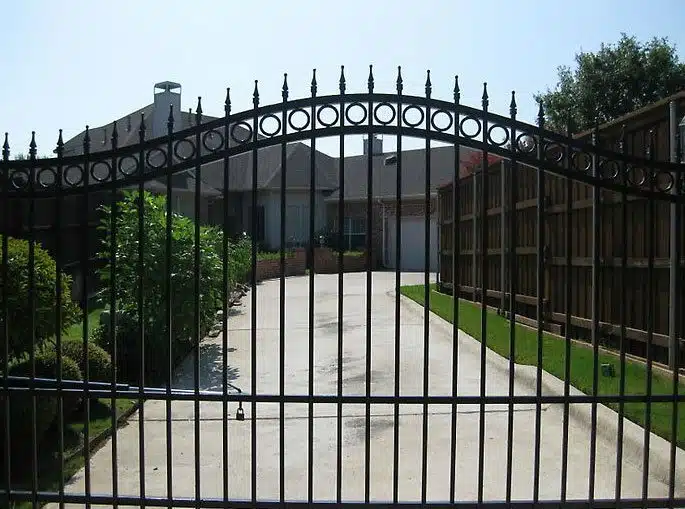P (972) 898-1307 | F (972) 499-1188
9 Questions to Ask Before Installing a Security Gate in Dallas

As a leading provider of fencing and gate services in Dallas, Texas State Fence understands the importance of securing your property. Whether you’re considering residential gates or commercial security gates, we’re here to guide you through the process to secure your property now. Before deciding to install a security gate, consider these eight crucial questions.
1. What is the Purpose of the Security Gate?
Are you aiming to increase security, improve aesthetics, control access, or add value to the entrance to your property? Perhaps you’re looking to achieve a combination of these objectives. Understanding the purpose of your security gate is the first step in making an informed decision.
Steel or iron gates are often the best choices for those Dallas residents primarily interested in security. These materials are durable and resistant to damage, providing a tough barrier against potential intruders. A beautifully crafted wood gate might be the perfect choice for property owners seeking to enhance their site with aesthetic appeal. Its natural look can add warmth and charm to any property, transforming an ordinary yard into an inviting sanctuary.
2. What Type of Gate Best Suits My Property?
The type and style of gate you choose can significantly affect the functionality and security of your property. Sliding gates, for example, are an excellent choice for properties with limited space. They slide back and forth along a track, requiring less room than swing gates. Sliding gates are also ideal for steep driveways where a swing gate wouldn’t be practical.
On the other hand, swing gates offer a classic, elegant look, swinging open like a door. They’re available in single swing gates, which consist of one large gate that swings forward when open and closed, and double swing gates, where two gates meet in the middle when closed.
Automatic gates provide added convenience, allowing you to control access without opening and closing the gate manually. With the right gate operator, you can open and close your gate with the push of a button, a key turn, or even a security pass code.
3. What Material Should My Security Gate Be Made Of?
The material of your gate can affect its durability, security, and aesthetic appeal. Steel and iron gates are robust and resistant to harsh weather conditions, making them ideal for high-security needs. They’re also quite versatile in design details, with options ranging from simple and functional to ornate and decorative.
Wood gates, on the other hand, add a touch of elegance and blend well with the surrounding landscape. They offer a rustic charm that’s hard to replicate with other materials. However, wood gates require regular maintenance, such as painting or staining, to maintain their appearance and prevent weather damage.
4. What Kind of Access Control System is Suitable?
The access control system is a critical component of operating your security gate. The mechanism determines who can or cannot access your property. These systems range from simple keypads to sophisticated biometric controls.
A system that logs entry and exit may benefit a business with many employees. It provides an audit trail of who is coming and going, which can be necessary for security and legal reasons.
For residential property, a simpler system may suffice. This could be a remote control or a keypad where family members enter a code to open or lock the gate.
5. What Type of Gate Operator Should I Choose?
The gate operator is another key consideration. This is the mechanism that allows your gate to open and close automatically. Gate operators vary based on gate type (swing gate open or slide), gate weight, and frequency of use.
For swing gates, there are two main types of operators: arm operators and underground operators. Arm operators are mounted on the gate and post and use a jackscrew or piston to move the gate. Underground operators are installed beneath the ground of the gate and are less visible than arm operators, offering a more aesthetic appeal.
The operator is typically a motor that moves the gate along its track for sliding gates. The type of operator you choose depends on the weight and size of the gate, as well as the level of use. A gate that is frequently opened and closed will require a more robust operator than one that is seldom used.
6. How Will the Gate Operate During a Power Outage?
In a power outage, the operation of your automatic gate can be affected. Ensuring your gate includes a backup system to keep it functioning during these periods is crucial. Some gate operators come equipped with backup batteries that kick in when the power goes out, ensuring your gate can open and close.
Moreover, some systems also feature a manual release that allows you to operate the gate by hand during a power outage. Discussing these features with your installer can help you prepare for any situation and ensure continued and secure access to your property.
7. What Safety Features Are Included?
Safety should be a primary concern when installing a security gate. Good safety features can prevent accidents and protect people and vehicles from harm. For instance, a well-designed security gate might include sensors that stop the gate from closing if an obstacle is detected or safety loops that prevent the gate from hitting a vehicle.
Other important safety features can include anti-crushing systems, which prevent the gate from causing injury if someone is caught while it’s closing, and emergency access systems that allow emergency services to open the gate if necessary. Be sure to ask your installer about these and other safety features.
8. How Much Maintenance is Required?
Maintenance is vital to the longevity and performance of your security gate. Regular maintenance will ensure the gate operates smoothly and helps prevent breakdowns that could compromise your security. Maintenance needs can vary based on the type of gate and its components. It could include cleaning the gate and its components, lubricating moving parts, and regularly checking the gate operator and access control systems. Additionally, wood gates might require periodic painting or staining to maintain their appearance and prevent weather damage.
Your Dallas installer should provide a maintenance schedule and guidelines to help you keep your gate in top condition. If you’d rather not handle the maintenance yourself, ask if the company offers a maintenance service. Knowing that your gate will receive professional care regularly could provide peace of mind.
9. Why Choose Texas State Fence?
At Texas State Fence, we pride ourselves on providing the Dallas, TX, community with high-quality fencing and gate services. Our extensive experience and commitment to excellence ensure we deliver solutions tailored to your needs. Whether you’re considering a robust steel or iron gate for enhanced security or a beautifully crafted wood gate for aesthetic appeal, we use only the finest materials designed for longevity. Our dedication to our customers sets us apart. We work closely with you from the initial consultation to the final installation, and our support extends beyond, offering maintenance services to keep your gate in optimal condition. For a trusted partner in your fencing and gate needs, contact Texas State Fence today.

